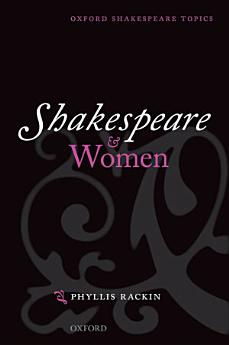Shakespeare and Women
Phyllis Rackin
maí 2005 · OUP Oxford
Rafbók
180
Síður
family_home
Gjaldgeng
info
reportEinkunnir og umsagnir eru ekki staðfestar Nánar
Um þessa rafbók
Shakespeare and Women situates Shakespeare's female characters in multiple historical contexts, ranging from the early modern England in which they originated to the contemporary Western world in which our own encounters with them are staged. In so doing, this book seeks to challenge currently prevalent views of Shakespeare's women-both the women he depicted in his plays and the women he encountered in the world he inhabited. Chapter 1, 'A Usable History', analyses the implications and consequences of the emphasis on patriarchal power, male misogyny, and women's oppression that has dominated recent feminist Shakespeare scholarship, while subsequent chapters propose alternative models for feminist analysis. Chapter 2, 'The Place(s) of Women in Shakespeare's World', emphasizes the frequently overlooked kinds of social, political, and economic agency exercised by the women Shakespeare would have known in both Stratford and London. Chapter 3, 'Our Canon, Ourselves', addresses the implications of the modern popularity of plays such as The Taming of the Shrew which seem to endorse women's subjugation, arguing that the plays-and the aspects of those plays-that we have chosen to emphasize tell us more about our own assumptions than about the beliefs that informed the responses of Shakespeare's first audiences. Chapter 4, 'Boys will be Girls', explores the consequences for women of the use of male actors to play women's roles. Chapter 5, 'The Lady's Reeking Breath', turns to the sonnets, the texts that seem most resistant to feminist appropriation, to argue that Shakespeare's rewriting of the idealized Petrarchan lady anticipates modern feminist critiques of the essential misogyny of the Petrarchan tradition. The final chapter, 'Shakespeare's Timeless Women', surveys the implication of Shakespeare's female characters in the process of historical change, as they have been repeatedly updated to conform to changing conceptions of women's nature and women's social roles, serving in ever-changing guises as models of an unchanging, universal female nature.
Um höfundinn
Professor Phyllis Rackin has taught Shakespeare at the University of Pennsylvania for forty years. A former President of the Shakespeare Association of America, she has published three books on Shakespeare as well as numerous scholarly articles on Shakespeare and related subjects in anthologies and in such journals as PMLA, Shakespeare Quarterly, and Shakespeare-Jahrbuch. Her awards include an ACLS fellowship and a Lindback award for distinguished teaching.
Gefa þessari rafbók einkunn.
Segðu okkur hvað þér finnst.
Upplýsingar um lestur
Snjallsímar og spjaldtölvur
Settu upp forritið Google Play Books fyrir Android og iPad/iPhone. Það samstillist sjálfkrafa við reikninginn þinn og gerir þér kleift að lesa með eða án nettengingar hvar sem þú ert.
Fartölvur og tölvur
Hægt er að hlusta á hljóðbækur sem keyptar eru í Google Play í vafranum í tölvunni.
Lesbretti og önnur tæki
Til að lesa af lesbrettum eins og Kobo-lesbrettum þarftu að hlaða niður skrá og flytja hana yfir í tækið þitt. Fylgdu nákvæmum leiðbeiningum hjálparmiðstöðvar til að flytja skrár yfir í studd lesbretti.







